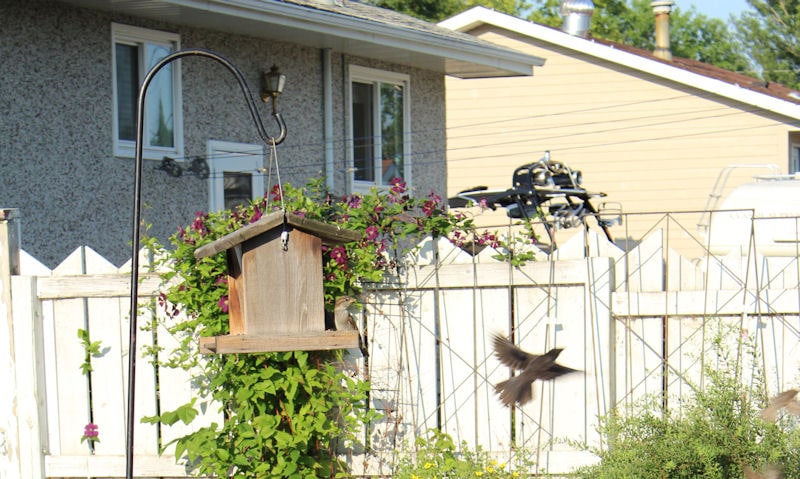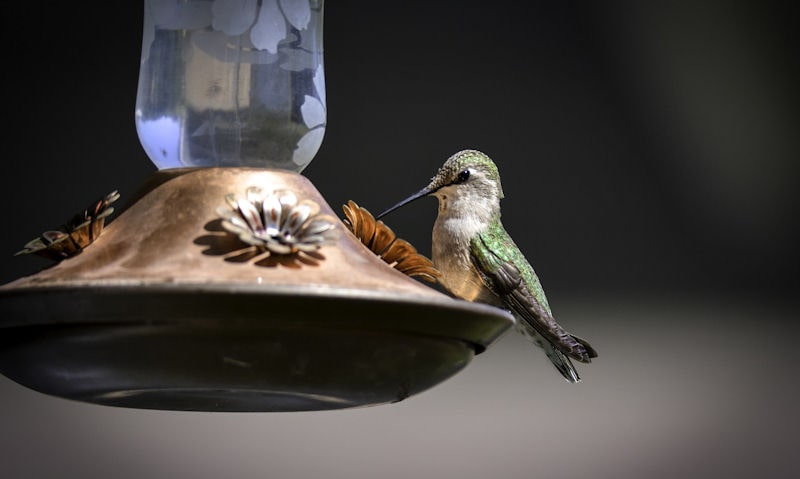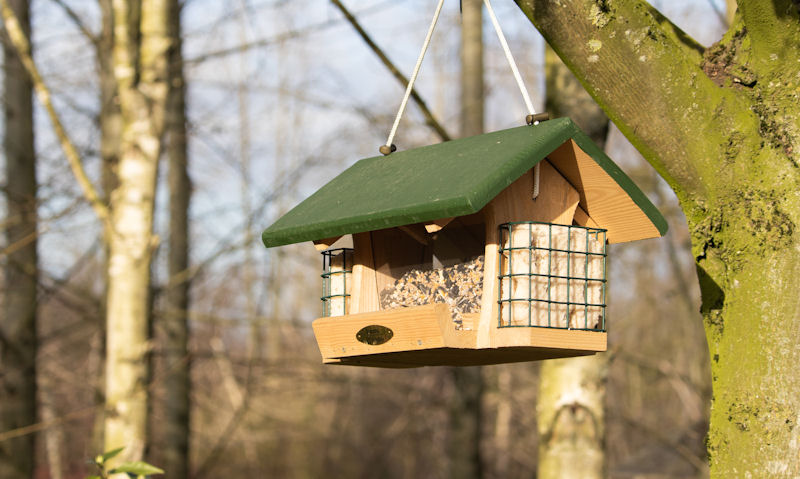Can I put a bird feeder in my front yard
It really can depend on your circumstances as your front yard issue may be a backyard issue for others, but it can't hurt to feed birds in the front yard if that is where birds seen.
You can put a bird feeder in the front yard if that is where you feel its better suited. Birds must already be frequenting the front side or else birds won't necessary visit a new feeding location. Front yards can be the busier side with people and cars, thus the backyard may be the best location after all.
Its certainly worth a try although bear in mind wild birds may not be so cooperative when it comes to the side of the house which is busy with people and traffic.
Front yards usually have lack trees and greenery and where there's a lawn, its often much smaller but a too busy area with you or your family.
You can put bird feeders in a front yard but treat it as an temporary measure only where an option to fullback on your backyard.
When wild birds are happily to feed at bird feeders on what will be a front yard providing plenty of space with no people or pets scaring them off; it also could be solution to keep nuisance pests like squirrels or chipmunks off bird feeders.
If you have trees in your front yard then hang a bird feeder within this tree to see if birds at least feed on this side of the house. No bites, then think twice about assembling your whole bird feeder equipment at the front, as it could be a waste of time.
Benefits could include putting bird feeders in the front yard because its more sunnier, of which you'll find Hummingbirds will benefit the most.
Dad or the kids could also find the front yard easier to go backyard bird watching, as they can now view birds better than the backyard side of the house.
Remember, where there's bird feeders often a bird bath must be set up near by, thus make space for a bird bath along side bird feeders in your front yard.
On the subject of safety, never put bird feeders in a new location where there's your neighbors cats, or perhaps your own cat that is ready to pounce on unaware wild birds.
Depends on your needs
Now I can't speak for every one but the idea of placing a bird feeder in what is essentially a busier, noisier front side of your house will really depend on your needs.
What needs those can be is to favor a more sunny side as oppose to a backyard that is enclosed in a darken corner - due to too many structures or tall trees.
Certainly there's no harm in re-positioning your bird feeders in your front yard if that is something you feel will benefit you. You'd need to do it for a month or so trial only to see how it goes - and I don't believe there to be any serious issues.
Front yards are usually the busier side as its where cars pass by, public walk by your property boundary, and of course - you and your family will regularly frequent the front yard when leaving for school or work and coming home again.
On the plus side the front yard could be the solution to creating shade for an Hummingbird feeder, where lack of sun could be effecting wild birds finding your feeders in your backyard.
Regardless, you can put bird feeders in your front yard while knowing it could be temporary as wild birds just might not bite on that side.
Unfortunately, its my backyard that is out of bounds due to too many neighbors cats arriving, and now its been over two decades since birds arrived in my backyard like they once did, with so many cats ready to pounce.
Busy front yard to be avoided
What the big issue is when re-positioning bird feeders in your front yard - and this could apply to a backyard for many people, like me - is the front side is busier, thus its likely to cause to much interference with wild birds daily feeding behavior.
Public passing by your fence or hedge is enough to keep common backyard birds at a distance - all while passing traffic is enough to startle birds while at the feeders.
Then there's you, your family and pets, of whom are all likely to use the front yard as way to go to work or school, or indeed attend the garage or loiter around while talking to the neighbors, as you do.
Busy front yards must be avoided if all this applies to you, and its made worse if this particular front yard is a small plot of land.
Large front yards with plenty of space for wild birds to freely escape unimpeded, is where their likely to be more willing to come to a front yard that provides plenty of room.
My front yard is actually the quietest side yet my backyard has now been without birds for as long as I can remember, thus it really will depend on your personally circumstances.
Front yards tend to lack vegetation
What you must realize with your common Finches, Warblers to Sparrows is that they really do require natural vegetation to be close to your bird feeders.
Why that is because trees, shrubs and hedges provide coverage where wild birds like to escape to when startled; or indeed a tree could be where a Blue Jay could take a shelled peanut to break open away from your bird feeders.
As you may know, front yards is usually the street side full of roads and pavements, thus natural vegetation is usually missing on this side of the house.
Sealed off backyards with only more backyards and trees tend to be how you attract birds to your yard, as it feels more like wild birds natural habitat.
With that in mind it could be why wild birds might not use bird feeders in your front yard, because there's no sight of trees or foliage they can escape to.
Where you might put a bird feeder in your front yard could force you to position the bird feeders too close to the house or property; due to lack of space you can take advantage of... and you really do require space when positioning bird feeders.
Stay in backyard if that is where birds are
Interestingly, it could be your wild birds who will tell you they prefer your backyard as oppose to the front - as they will simply stop turning up until bird feeders are returned to their original location.
You see your Cardinals, Blue Jays, Sparrows to House Finches might not want to feed in this new yet out of view location.
And therefore you will have no choice but to put bird feeders back where they belong.
Never remove bird feeders if you feel wild birds are seen far less or not at all in your front yard. On the other hand, if it hasn't been tried before who's to say you can't eventually attract wild birds in to the front yard instead.
I really think it will depend on your circumstances but its vitally important to remember, it can be hard to force wild birds in to a new feeding territory, of which the front yard is.
Where you place a bird feeder in your backyard may not be replicated in your front yard, due to lack of trees, vegetation and of course, a nice big lawn - where ground feeding birds eat spilled seeds, or natural seeds of grasses and weeds.
I will say though to re-position your bird feeders in the front yard could be the solution to keeping deer out of bird feeders. Similarly, squirrels could be kept out of feeders in the front yard - as visiting woodland creatures tend to stay on one side of the house.
Summarize
It certainly will depend on your needs as many of us could be experiencing the opposite, with some of us considering putting our bird feeders in the backyard.
You can re-position bird feeders in your front yard if you wish, but understand if this is the busy street side with cars and people - then expect to see a downturn in how many birds will come visiting your bird feeders now situated in the front yard.
Unfortunately, the front yard could be the side where there's no trees or lack of greenery, of which this could be enough to keep wild birds away.
If you have a front yard that has plenty of space between the house and property boundary - with the bird feeders centered in middle somewhere - then birds will be more willing as it will feel safer to them.
Large, spacious front yards also let in more sunshine which is an important factor for attracting birds to bird feeders.
Small, enclosed front yards with only a few feet to the public pavement won't see much success.
Stay in your backyard if that is where most of your birds frequent in the day - where there's trees and natural foliage - and where its quietest with no people disturbing feeding birds.


